
Journal of Pediatric Genetics
Scope & Guideline
Unlocking the Secrets of Genetic Influences on Child Health
Introduction
Aims and Scopes
- Genetic Etiology of Pediatric Disorders:
The journal emphasizes the identification and characterization of genetic mutations associated with various pediatric disorders, including congenital anomalies, metabolic syndromes, and neurodevelopmental conditions. - Clinical Genetics and Genomic Medicine:
It covers clinical studies that explore the application of genetic testing and genomic medicine in diagnosing and managing pediatric diseases, enhancing patient care and treatment outcomes. - Phenotype-Genotype Correlation:
Research articles often focus on correlating clinical phenotypes with genetic mutations, helping to elucidate the impact of specific genes on disease presentation and progression. - Multidisciplinary Approaches to Pediatric Genetics:
The journal encourages studies that integrate genetic research with clinical practice, public health perspectives, and family dynamics to provide a holistic view of genetic disorders in children. - Ethical and Social Implications of Genetic Testing:
It addresses the ethical considerations and social implications surrounding genetic testing and counseling for families affected by genetic disorders.
Trending and Emerging
- Next-Generation Sequencing and Genomic Technologies:
There is an increasing emphasis on the use of next-generation sequencing and whole-exome sequencing to uncover genetic causes of pediatric conditions, reflecting a shift towards more comprehensive genetic analysis. - Genetic Contributions to Neurodevelopmental Disorders:
Research on the genetic basis of neurodevelopmental disorders, such as autism spectrum disorders and intellectual disabilities, is gaining traction, as understanding these complex conditions is crucial for early diagnosis and intervention. - Ethical Considerations in Genetic Testing:
With the rise of genetic testing accessibility, discussions around ethical implications, informed consent, and the psychosocial impact of genetic information on families are becoming more prominent in the literature. - Integrative Approaches in Pediatric Genetics:
There is a trend towards multidisciplinary studies that combine genetics with other fields, such as neurology, cardiology, and developmental pediatrics, to better understand the holistic impact of genetic disorders. - Focus on Rare Genetic Disorders:
An increasing number of publications are dedicated to rare genetic disorders, aiming to provide detailed case studies, clinical experiences, and novel findings that contribute to the understanding and management of these conditions.
Declining or Waning
- Traditional Genetic Screening Methods:
As advancements in next-generation sequencing and genomic technologies take precedence, traditional genetic screening methods are being overshadowed, leading to a decline in articles focused on these older methodologies. - Generalized Discussions on Genetic Counseling:
While genetic counseling remains a critical component of pediatric genetics, the journal has seen fewer articles that broadly discuss genetic counseling practices without specific case studies or new insights. - Congenital Syndromes with Limited Genetic Insights:
Research focusing on well-established congenital syndromes with limited new genetic discoveries has decreased, as the field shifts towards novel findings and complex genetic interactions.
Similar Journals

PEDIATRIC NEUROLOGY
Elevating Standards in Pediatric Neurology ResearchPediatric Neurology, a prestigious journal published by Elsevier Science Inc, is a leading resource in the field of child neurology and developmental neurosciences. With an impressive impact factor and categorization in the Q1 and Q2 quartiles across several relevant fields, including Pediatrics, Neurology, and Developmental Neuroscience, this journal is essential for researchers and healthcare professionals focused on pediatric neurological disorders. Since its inception in 1985, it has provided a platform for high-quality research, clinical studies, and reviews that drive advancements in diagnosis, treatment, and understanding of neurological conditions in children. Although the journal does not currently offer open access, it maintains a robust reputation in the academic community, bolstered by its prominent ranking in Scopus metrics. By engaging with the latest findings published in Pediatric Neurology, readers will gain vital insights that contribute to improving pediatric healthcare outcomes in neurology and neuroscience.

GENETICS IN MEDICINE
Advancing the Future of Personalized MedicineGENETICS IN MEDICINE, published by Elsevier Science Inc, stands as a premier journal in the realms of clinical genetics and medicine. With an impressive impact factor and ranked #3 out of 99 in the category of Genetics (clinical), alongside a 97th percentile ranking in the Scopus database, this journal is recognized for its outstanding contribution to the field. Established in 1998, it aims to disseminate innovative research and clinical advancements bridging genetics and medical practice, making it essential reading for researchers, healthcare professionals, and students alike. Although not an open-access journal, GENETICS IN MEDICINE provides valuable insights into genetics that drive the future of personalized medicine and patient care. With a commitment to excellence, the journal continuously explores the evolving landscape of genetic research to foster the understanding and application of genetic principles in medical contexts.

Clinical Pediatric Endocrinology
Bridging research and clinical excellence in pediatric endocrinology.Clinical Pediatric Endocrinology is a prestigious journal dedicated to advancing the field of pediatric endocrinology, published by the Japanese Society of Pediatric Endocrinology. With a respectable ISSN 0918-5739 and E-ISSN 1347-7358, this journal serves as a critical platform for innovative research spanning various aspects of endocrine disorders in children, including diabetes and metabolic conditions. Although it does not currently offer open access, it remains highly relevant in its category, being ranked in Q4 and Q3 tiers across multiple specialties as of 2023. With a publication history that spans from 1992 to 2024, this journal has contributed significantly to the literature, as evidenced by its inclusion in prominent databases. It invites submissions from researchers and practitioners worldwide, aiming to facilitate knowledge sharing and improve clinical practices in pediatric endocrinology. For those dedicated to enhancing care outcomes in children with endocrine disorders, Clinical Pediatric Endocrinology provides essential insights and fosters a community of engaged professionals.

KLINISCHE PADIATRIE
Advancing Pediatric Care Through Innovative ResearchKLINISCHE PADIATRIE is a prominent academic journal published by GEORG THIEME VERLAG KG since its inception in 1972. Based in Germany, this journal serves as a valuable resource for professionals and researchers in the fields of Pediatrics, Perinatology, and Child Health. With an ISSN of 0300-8630 and E-ISSN 1439-3824, it features a rich array of peer-reviewed articles that focus on child health and development, encompassing clinical practices, therapeutic advances, and interdisciplinary approaches to pediatric care. While the journal operates on a subscription basis, its impact within the academic community is evidenced by its ranking of Q3 in Pediatrics, Perinatology, and Child Health as of 2023, and it maintains a solid standing within Q4 in Medicine (miscellaneous). The journal aims to bridge the gap between emerging research and clinical practice, providing a platform for innovative ideas that enhance pediatric care. Researchers, medical professionals, and students alike will find KLINISCHE PADIATRIE an essential addition to their academic repertoire, fostering advancements in pediatric healthcare and enriching knowledge in this vital field.

NATURE MEDICINE
Uncovering the Future of Medicine Through Rigorous ScienceNATURE MEDICINE, published by NATURE PORTFOLIO, is a premier journal in the fields of medicine and biochemistry, recognized for its rigorous peer-review process and high-impact research contributions. With an impressive Scopus ranking placing it in the top percentile—#3 out of 636 in General Medicine and #2 out of 221 in General Biochemistry, Genetics, and Molecular Biology—it embodies excellence and innovation in biomedical science. The journal has been a vital source of cutting-edge discoveries since its inception in 1995, and it encompasses a wide range of topics including clinical research, translational medicine, and advances in genetic technologies. The journal’s impact factor reflects its significance, making it an essential resource for researchers, professionals, and students aiming to stay at the forefront of medical science. Though the journal follows a subscription model, it remains crucial for disseminating pivotal research findings that shape the future of healthcare and therapeutic strategies worldwide.

Fetal and Pediatric Pathology
Transforming research into better outcomes for children.Fetal and Pediatric Pathology, an esteemed journal published by TAYLOR & FRANCIS INC, is dedicated to advancing the field of pediatric and fetal medicine through the dissemination of high-quality research and clinical insights. With an ISSN of 1551-3815 and an E-ISSN of 1551-3823, the journal has been a key resource for researchers and practitioners since its inception in 1983. Based in the United Kingdom, it covers a broad spectrum of topics relevant to Medicine, Pathology and Forensic Medicine, and Pediatrics, Perinatology, and Child Health, consistently reflecting on contemporary challenges faced in these fields. The journal has attained a commendable Q3 ranking within its categories as of 2023, underlining its relevance in the academic community. Though not an open-access publication, the research presented in Fetal and Pediatric Pathology plays a pivotal role in informing practice, guiding future studies, and enhancing the understanding of diseases affecting fetuses and children. Its convergence of research throughout multiple years, continuing until 2024, marks it as a crucial platform for ongoing scientific dialogue and innovation, aimed at fostering better health outcomes for younger populations.

Medizinische Genetik
Bridging Theory and Practice in Medical Genetics.Medizinische Genetik is a distinguished academic journal, published by Walter de Gruyter GmbH, that serves the field of medical genetics, offering insights and developments in both clinical and laboratory settings. Since its inception in 1994, the journal has provided a platform for researchers and professionals to disseminate their findings, contributing significantly to scientific discourse in genetics. Although currently listed in the Q4 category for both Genetics and Clinical Genetics according to the 2023 rankings, it remains a vital resource for those looking to understand the evolving landscape of medical genetics. This peer-reviewed journal is accessible through various academic platforms, fostering collaboration and knowledge sharing among academics, clinicians, and students alike. As the journal converges towards 2024, it continues to solidify its role in enhancing the understanding of genetic disorders and innovations in genetic research.

Translational Pediatrics
Bridging Research and Care for Healthier Futures.Translational Pediatrics is a leading journal in the field of Pediatrics, specializing in bridging the gap between laboratory research and clinical practice. Published by AME Publishing Company in Hong Kong, this journal aims to promote the translation of scientific discoveries into innovative interventions for child health. With its ISSN 2224-4336 and E-ISSN 2224-4344, the journal is accessible to a global audience, enhancing knowledge sharing among researchers, clinicians, and educators. Recognized in 2023 as a Q2 category journal in Pediatrics, Perinatology, and Child Health, it ranks 72nd out of 330 according to Scopus, placing it in the top 22% of its category. With an impactful Convergence of research from 2015 to 2024, Translational Pediatrics is dedicated to providing an essential platform for high-quality studies that advance pediatric care and foster best practices in child health.

JOURNAL OF HUMAN GENETICS
Exploring the Frontiers of Human GeneticsWelcome to the Journal of Human Genetics, a premier publication in the field of human genetics, published by SpringerNature. With a commitment to sharing groundbreaking research, this journal has been at the forefront of genetic studies since its establishment in 1961, converging its focus in 1996 and continuing to evolve through 2024. It holds a respected Q2 ranking in both the Genetics and Clinical Genetics categories, reflecting its significant contribution to the scientific community. With a notable Scopus ranking of 23rd out of 99 in Clinical Genetics and 95th out of 347 in Genetics, the journal offers a platform for high-impact research that informs clinical practices and advances the understanding of genetic disorders. Operating under an open-access model, it ensures that findings are readily accessible to researchers, professionals, and students worldwide. Join us in exploring the complexities of human genetics and contribute to the ongoing discourse in this dynamic field.

Journal of Clinical Research in Pediatric Endocrinology
Bridging research and practice in child endocrinology.Journal of Clinical Research in Pediatric Endocrinology is a premier open-access journal dedicated to advancing the field of pediatric endocrinology through rigorous research and innovative findings. Published by GALENOS PUBL HOUSE, this journal has established itself as a key resource since its inception in 2008, serving a broad audience of researchers, healthcare professionals, and students in the fields of endocrinology, pediatrics, and child health. With an impact factor reflecting its significance (currently ranked in the Q2 and Q3 quartiles across multiple relevant categories), it provides a platform for high-quality peer-reviewed articles that encompass clinical observations, experimental studies, and reviews. The journal operates under an open-access model, ensuring that findings are accessible to a global audience, fostering collaborative solutions for the challenges in pediatric endocrine disorders. Residing in Turkey, the journal continues to impact the scientific community by disseminating valuable research that promotes better understanding and treatment of hormonal and metabolic disorders in children.